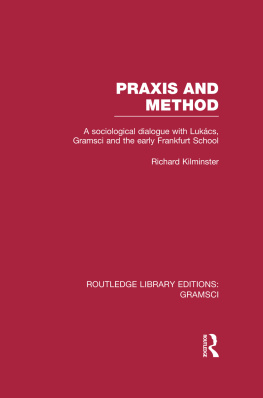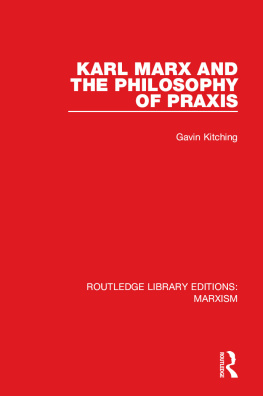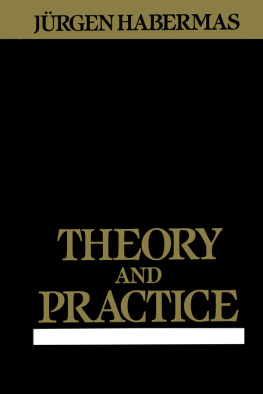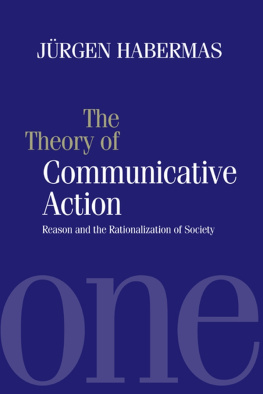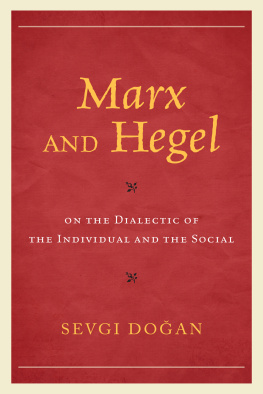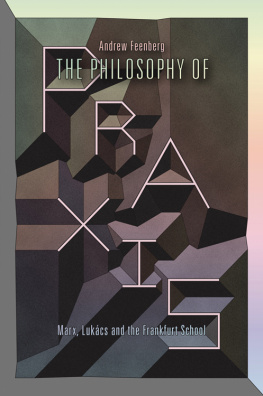ROUTLEDGE LIBRARY EDITIONS: GRAMSCI
Volume 2
PRAXIS AND METHOD
PRAXIS AND METHOD
A sociological dialogue with Lukcs, Gramsci and the early Frankfurt School
RICHARD KILMINSTER
First published in 1979
This edition first published in 2014
by Routledge
2 Park Square, Milton Park, Abingdon, Oxon, OX14 4RN
and by Routledge
711 Third Avenue, New York, NY 10017
Routledge is an imprint of the Taylor & Francis Group, an informa business
1979 Richard Kilminster
All rights reserved. No part of this book may be reprinted or reproduced or utilised in any form or by any electronic, mechanical, or other means, now known or hereafter invented, including photocopying and recording, or in any information storage or retrieval system, without permission in writing from the publishers.
Trademark notice: Product or corporate names may be trademarks or registered trademarks, and are used only for identification and explanation without intent to infringe.
British Library Cataloguing in Publication Data
A catalogue record for this book is available from the British Library
ISBN: 978-0-415-74361-7 (Set)
eISBN: 978-1-315-79439-8 (Set)
ISBN: 978-1-138-01538-8 (Volume 2)
eISBN: 978-1-315-79440-2 (Volume 2)
Publishers Note
The publisher has gone to great lengths to ensure the quality of this reprint but points out that some imperfections in the original copies may be apparent.
Disclaimer
The publisher has made every effort to trace copyright holders and would welcome correspondence from those they have been unable to trace.
Praxis and method
A sociological dialogue with Lukcs, Gramsci and the early Frankfurt School
Richard Kilminster
First published in 1979
by Routledge & Kegan Paul Ltd
39 Store Street, London WC1E 7DD,
Broadway House, Newtown Road,
Henley-on-Thames, Oxon RG9 1EN and
9 Park Street, Boston, Mass. 02108, USA
Set in 10 on 11 pt Times by
Gloucester Typesetting Co. Ltd, Gloucester
and printed in Great Britain by
Redwood Burn Ltd
Trowbridge and Esher
Richard Kilminster 1979
No part of this book may be reproduced in
any form without permission from the
publisher, except for the quotation of brief
passages in criticism
British Library Cataloguing in Publication Data
Kilminster, Richard
Praxis and method. (International library of sociology). 1. Communism and society 2. Practice (Philosophy) I. Title II. Series
301'. 01 HX542 7940376
ISBN 0 7100 0094 4
To the memory of my parents,
Albert and Christina Kilminster
The variegated canvas of the
world is before me; I stand
over against it; by my
theoretical attitude to it I
overcome its opposition to me
and make its contents my own.
I am at home in the world
when I know it, still more so
when I have understood it.
Hegel
Contents
I wish to express my gratitude to Clive Ashworth, Ian Clegg, Doug McEachern, Patrick Hayes, Peter Green, Alan Warde and Scott Beadle, with whom I have had many stimulating discussions about the themes of this book. Zygmunt Bauman, in particular, provided perceptive criticism and guidance when I was preparing an earlier version as a doctoral thesis and Tom Bottomore and Gianfranco Poggi gave helpful critical comments. I have also been sustained by the continuing intellectual encouragement of Norbert Elias. My debt to him is incalculable. As is my gratitude to Bebe Speed for her practical help, forbearance and sympathy.
The author and publisher are grateful for permission to reprint certain materials from the publications listed below:
From W. B. Yeats: A Dialogue of Self and Soul from The Collected Poems of W. B. Yeats. Reprinted by permission of M. B. Yeats and the Macmillan Company of London and Basingstoke.
From Max Horkheimer, Critical Theory, S. Fischer Verlag GmbH, Frankfurt am Main. English translation Copyright 1972 by Herder & Herder, Inc. Reprinted by permission of The Seabury Press, New York and S. Fischer Verlag.
From Georg Lukcs, History and Class Consciousness: Studies in Marxist Dialectics, translated by Rodney Livingstone. Reprinted by permission of the Merlin Press Ltd.
From Selections from the Prison Notebooks of Antonio Gramsci (edited and translated by Quintin Hoare and Geoffrey Nowell-Smith). Reprinted by permission of Lawrence & Wishart, Publishers, London.
Foreword to the reissued edition
Given that 35 years have elapsed since the first publication of this book, I will provide some pointers for contemporary readers to aid the understanding of the argument of this study and the context in which it was written. It bears the marks of a specific period in the development of sociology that I subsequently termed its Conflict Phase,1 which lasted from about 1965 to the mid-1980s. This phase coincided with a particularly discordant stage in the development of post-war British society and culture the 1960s and 70s. It was a time of considerable political polarization and psychological tension, brought about amongst other things by acute industrial and generational conflict, emancipatory movements of blacks, gays, women, students and ethnic minorities as well as the breaking down of formal behavioural codes and sexual taboos. It was a highly politicised and volatile period.
In the expanding discipline of sociology these tensions and struggles were played out as the war of the schools when rival paradigm groups, including ethnomethodology, structuralism and varieties of Marxism, competed to be heard as a younger generation assailed in the name of Karl Marx the structural-functionalist orthodoxy of the sociology establishment, epitomised by Talcott Parsons. As a result, one of the most intractable and pervasive sociological controversies of the time was the issue of political partisanship in the social sciences. Marxists made big claims for the superior cognitive power of praxis, the idea that knowing the world whilst changing it in the interests of the proletariat existed on a higher plane scientifically from passively interpreting society in the manner of bourgeois sociology. By the time I started research for this book these debates were well advanced and had become frozen into the seemingly irreconcilable opposition of Marxism versus sociology.
In this volume I began the process of thinking my way out of this coercive dualism. It was an attempt to go beyond it by arguing against sociology in a Marxist fashion and against Marxism in a sociological fashion, inspired by the Hegelian idea of raising the two oppositions to a higher standpoint, thus preserving the truths of both on another level. This is why the subtitle announces a dialogue with key figures in the Marxian canon. Besides Hegel, I was inspired by German social thought generally, including hermeneutics, phenomenology, the sociology of knowledge and the work of Norbert Elias. This absorption accounts for the books deeply historical perspective. However, my sporadic lapses into Hegelian obscurity might try the patience of some readers.

